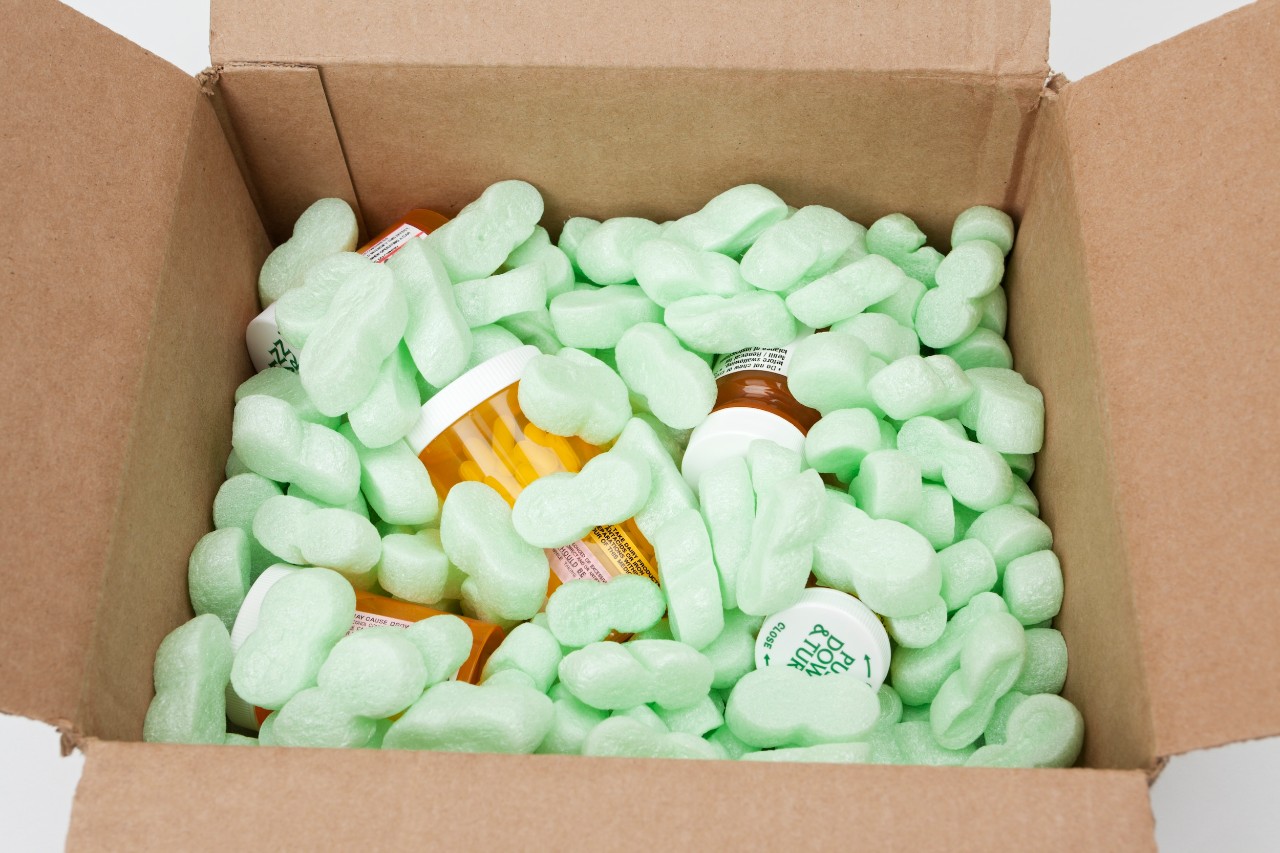
UC College of Medicine receives grant to launch styrofoam recycling project
Initiative’s goal is to keep expanded polystyrene waste out of local landfills
The passion and advocacy of a small number of committed people have led the University of Cincinnati College of Medicine to take on an ambitious new project: a program to recycle expanded polystyrene (EPS), including styrofoam and plastic foam packaging.
With more than 250 labs, the College of Medicine has an international reputation in biomedical research. But with that comes more than 900 pounds of EPS waste per month — more than five tons a year.

The Vontz Center for Molecular Studies accumulates massive amounts of styrofoam waste that will now be recycled. Photo/Margherita Melegari, MD, PhD
The waste is primarily the result of the research labs ordering supplies and then receiving many temperature-sensitive and perishable items such as antibodies, hormones and reagents shipped in styrofoam containers and cushioned with packing peanuts. Because EPS waste isn’t currently accepted by local recycling programs, it goes into landfills.
“It’s high time for such a program,” said Ana Luisa Kadekaro, PhD, associate research professor and clinical trials manager in the Department of Dermatology, who spearheaded this effort and is the principal investigator of the grant. “We are going to lead the way in the College of Medicine and start taking steps in the right direction.”
Eco Development, a company headquartered in Mason, Ohio, offers the state’s first styrofoam/EPS consumer drop-off program. Eco Development compresses and densifies EPS to turn it into blocks, then sells the material to other companies in the U.S. and overseas for reuse in insulation or other styrofoam products. Reusing existing styrofoam keeps it out of landfills and also reduces the need for styrene, a highly volatile liquid used to make plastics and rubber.
The college will establish this recycling program for materials that are traditionally difficult to recycle by way of a $53,600 Hamilton County Recycling ReSource Impact grant, with UC and the college providing an additional $13,400 in matching funds. After the waste is hauled from UC to Mason, Eco Development will reimburse the college a small amount per ton of styrofoam received.
“This is about doing the right thing and assuming responsibility for the waste we generate,” said Kadekaro, who toured the facility to see the process in person. “Our long-term goal is to divert 100% of the college’s EPS waste to keep it out of local landfills. We want to create a more sustainable environment for our children and grandchildren.”

Piles of styrofoam coolers and packaging waiting to be recycled at the Vontz Center for Molecular Studies. Photo/Margherita Melegari, MD, PhD
Margherita Melegari, MD, PhD, senior research associate in the Division of Hematology and Oncology in the Department of Internal Medicine, already has been leading a recycling initiative at the Vontz Center for Molecular Studies. With the help of UC Grounds and Moving Services, Vontz labs have recycled 223 pounds of EPS through Eco Development since July.
The program is now expanding to include the Medical Sciences Building, with the Kettering Lab Complex and Reading campus to come soon.
“The work of Drs. Kadekaro and Melegari has already been extremely impactful,” said Brieanne Sheehan, MBA, program director in the college’s Office of Research and member of the project team.
Instructions for proper recycling are being disseminated on campus (UC login required), but volunteers from each lab are needed to make sure the styrofoam is in the proper condition for recycling and to get it to collection points.
“We hope everyone in the College of Medicine gets behind this and commits to involvement,” said Kadekaro. She pointed out some lab staff have already been collecting the styrofoam and taking it for recycling on their own.
Steve Knost, executive director of the College of Medicine’s IT and facilities, has helped locate space in both the Vontz and the Medical Sciences Building where clean styrofoam is to be stored until pickup.
Data on the amount of recycling generated by this pilot project will be collected to give organizers a better estimate of how much could be recycled moving forward, and the resulting reports will be used to engage more people in the university community. If all goes well, expansion to other colleges, including the College of Nursing and College of Allied Health Sciences, could come with support from the university.
Impact Lives Here
The University of Cincinnati is leading public urban universities into a new era of innovation and impact. Our faculty, staff and students are saving lives, changing outcomes and bending the future in our city's direction. Next Lives Here.
Featured image at top: JulNichols/iStock
Related Stories
UC College of Medicine receives grant to launch styrofoam recycling project
December 5, 2024
Through a ReSource Impact grant from Hamilton County Recycling, the University of Cincinnati College of Medicine is launching a program to recycle expanded polystyrene (EPS), including styrofoam and plastic foam packaging.
Learning more about how cancer affects stroke risk
October 16, 2023
A collaborative team led by University of Cincinnati, University of North Carolina and Duke University researchers is studying how specific cancers and treatments affect patients' risk of stroke.
Head and neck, breast cancer research highlights AACR abstracts
April 14, 2023
University of Cincinnati Cancer Center researchers will present more than a dozen abstracts at the American Association for Cancer Research Annual Meeting 2023, held in Orlando, Florida, April 14-19, including findings that could advance treatments for head and neck and breast cancers.
